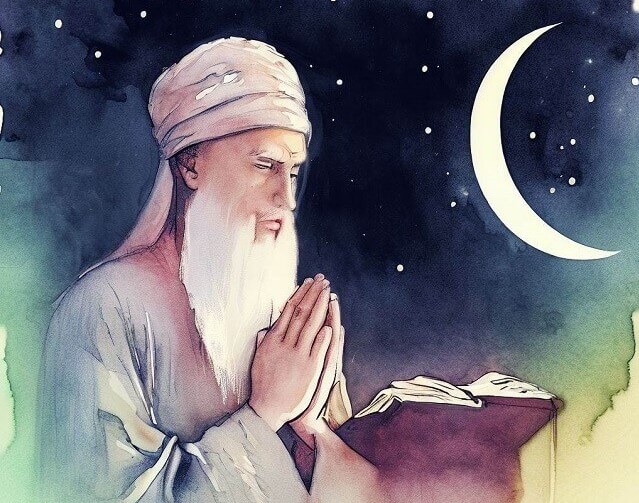
Shabbat Mevarchim
On the Shabbat before Rosh Chodesh, the new Hebrew month, we announce the new month with a special prayer, called Birkat HaChodesh. We pray that the coming month will be a time of good health, peace, and blessing.
The first paragraph of Birkat HaChodesh is an ancient prayer composed by third-century scholar Abba Arikha (‘Rav'), founder of the famed Babylonian academy of Sura. Here is the text of Rav’s prayer, as recorded in the Talmud:
“May it be Your will, the Eternal our God, to grant us long life,
a life of peace,
a life of good,
a life of blessing,
a life of sustenance,
a life of vigor of the bones,
a life marked by reverence of Heaven and dread of sin,
a life without shame and embarrassment,
a life of riches and honor,
a life in which we may be filled with love of Torah and awe of Heaven,
a life in which You will fulfill all of our hearts’ desires for good.” (Berakhot 16b)
While the prayer does mention love of Torah and awe of Heaven, most of the requests appear to refer to life’s material aspects: sustenance and physical vigor, riches and honor. Were these wishes foremost in the prayers of that pious scholar?
The True Meaning of Rav’s Prayer
Rav Kook taught that we should be careful not to understand the requests of Rav’s prayer in a superficial way. The focus is not on material blessings but spiritual goals. Each request relates to some aspect of spiritual growth and reaching our life’s higher mission.
“May it be Your will... to grant us long life” — חַיִּים אֲרוּכִים. A long life does not mean long in years, but long in content and accomplishments. This is a preamble for the requests that follow.
“A life of peace” — חַיִּים שֶׁל שָׁלוֹם. This refers, not only to peaceful relations with others, but to our own inner peace and harmony. We should not be stymied by internal qualities — flawed character traits, confusion, intellectual blunders — which undermine our efforts to grow spiritually.
“A life of good” — חַיִּים שֶׁל טוֹבָה. No, this is not a request for good times and affluence. This is a spiritual request, a prayer that all external factors which affect us, should influence us in good directions and positive ways.
“A life of blessing” — חַיִּים שֶׁל בְּרָכָה. Not blessings that we receive, but blessings that we give. May we bring blessings to the world through our actions: helping the needy, consoling the broken-hearted, and providing moral leadership and direction.
“A life of sustenance” — חַיִּים שֶׁל פַּרְנָסָה. A prayer that all our needs be met — physical, psychological, and spiritual.
“A life of vigor of the bones” — חַיִּים שֶׁל חִלּוּץ עֲצָמוֹת. In a Talmudic discussion in Yevamot 102b, Rabbi Elazar surprisingly noted, “This is the best blessing of all!” Physical vigor and energy are important in life; but is this the most important blessing that one can ask for?
Rav Kook explained that chilutz atzamot refers to our mindset and outlook. We pray that we should be willing and eager to undertake our spiritual mission, our special service of God. We should not feel that avodat Hashem is a burden. This is the ultimate blessing, for the goal of all blessings is the path itself: our service of God. As the Sages wrote, we should seek “God’s mitzvot, and not the reward for observing His mitzvot.”
“A life without shame and embarrassment” — חַיִּים שֶׁאֵין בָּהֶם בּוּשָׁה וּכְלִמָּה. No one is perfect. We all have shortcomings and weaknesses, a source of embarrassment. But our lives as a whole — the choices we make and the actions we take — should be without shame, a reflection of our better qualities. We should be able to look at our lives with pride and satisfaction.
“A life of riches and honor” — חַיִּים שֶׁל עשֶׁר וְכָבוֹד. Sometimes wealth can change a person, undermining his integrity, befuddling his values, blinding him to his true goals. Therefore we ask that our wealth be bound with true honor, namely, our values and higher goals.
And finally, we ask for “a life in which You will fulfill all of our hearts’ desires for good” — חַיִּים שֶׁיְּמַּלֵא ה’ מִשְׁאֲלוֹת לִבֵּנוּ לְטוֹבָה. Why tack on at the end, “for good”? Sometimes people wish for things — personal gain, material wealth — which they think will be good. We pray that our hearts’ desires will be for that which truly is good, complementing the ultimate goal and the greatest good.
(Adapted from Olat Re’iyah vol. II, pp. 121-123)





